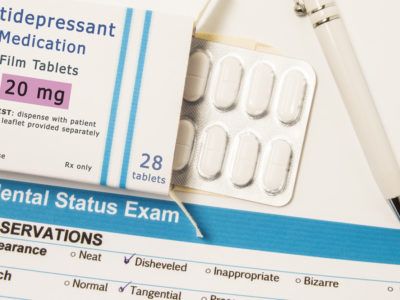Table of Contents[Hide][Show]
If you’re like most Americans, you’re surrounded by gut-harming toxins right now… and you probably don’t even know it.
But your body does.
From minor symptoms such as occasional bloating to chronic health conditions, toxins can be altering your gut microbiome.
But what are these toxins? Where are they coming from?
The answer might surprise you!
Let’s take a look at the toxins that do the most damage to your gut health, so you can take steps today to cut them out.
11+ Toxins That Harm Your Gut
Are you ready to support your gut health by eliminating the biggest toxins?
Here are the foods, chemicals, and products you should reduce or eliminate completely.
1. Alcohol
Alcohol can have harmful effects on your body, and they go far beyond the symptoms of a hangover.
For starters, several studies show that alcohol can promote the growth of “bad” bacteria in the gut microbiome, leading to dysbiosis.
And, alcohol can increase the permeability of your gut lining. The larger gaps make it easier for pathogenic bacteria, toxins, and other harmful substances to get through, a condition commonly referred to as a “leaky gut.”
2. Antibiotics
Can a medicine created to improve your health be considered a toxin? In the case of antibiotics, the answer is a definite yes.
Antibiotics are commonly prescribed to treat bacterial infections. In theory, they attack the bacteria that is harming your body.
But in reality, antibiotics are rarely that sophisticated. Instead, they work by attacking all bacteria, pathogenic and beneficial alike.
- This can wipe out the bacteria in your gut, leaving room for pathogenic bacteria to flourish.
- Any surviving strains of bacteria, including harmful ones, can develop stronger resistance to treatment and will be harder to eradicate in the future.
3. Artificial Colors
Manufacturers typically add artificial colors for aesthetic appeal, especially in breakfast foods, chips, candy, sweets, and pre-packaged snacks. Unfortunately, those brightly colored treats sitting in your pantry aren’t just bad for your diet; they’re also harming your gut.
Food dyes have long been associated with ADHD and other behavioral issues in children, especially.
Now, research also links some of the most popular dyes—particularly Red 40, Yellow 5, and Yellow 6—to poor gut health, including Inflammatory Bowel Disease and Crohn’s Disease. Other studies show that Red 40 can lead to an unbalanced gut microbiome and colonic inflammation.
Related
Natural Alternatives To Synthetic Food Coloring
Find out what the synthetic food dyes are that go into the food you eat, how they affect your body, and how to eliminate them from your diet with natural alternatives.
4. Artificial Sweeteners
Health-conscious consumers often reach for products labeled “sugar-free,” thinking that it’s the best choice for their body.
Although sugar can act as a toxin in your gut, replacing it with artificial sweeteners can be just as bad for your gut.
Studies show that at least 3 commonly used artificial sweeteners, saccharin, sucralose, and stevia, can significantly alter the composition of your gut microbiome. They can kill or damage the beneficial bacteria in your gut, allowing pathogenic bacteria to flourish and leading to an imbalanced microbiome.
5. Bisphenol A (BPA)
BPA is a toxic chemical that has been used in plastic products since the 1950s. It’s been used in dishes, utensils, cups, water bottles, and even baby bottles.
BPA can contaminate food and drinks, such as the drinks in your favorite sports bottle or the food you store in plastic containers. Heating up BPA products, for example, when you microwave food or heat up a baby bottle, can increase the amount of contamination.
Studies show that BPA, when consumed, can alter your gut microbiome and cause dysbiosis. Children, because of their lower body mass, are especially susceptible to the effects of BPA.
6. Fluoride
Brushing your teeth can also damage your gut health—if you use the wrong toothpaste.
Fluoride has been commonly thought to be vital for preventing tooth decay and supporting strong, healthy bones and teeth.
Because of that, you’ll find that many, if not most, toothpaste brands add fluoride to their products. And, in many communities, fluoride is also added to public water.
The key here is balance. Studies show that while some level of fluoride is desirable, high doses of fluoride can damage the colonies of beneficial bacteria in your gut.
7. Gluten
You’ll often see labels at your grocery store promising that a product is “gluten-free.” But what does that mean?
Gluten is a protein found in the most common flours, including wheat, rye, and barley flours. And while it’s not always designated as a toxin, it can have toxic effects on your gut.
Celiac disease, a chronic digestive disorder, is triggered by the immune system’s reaction to gluten. And about 15% of the U.S. population has a non-Celiac gluten intolerance.
Some of the digestive symptoms of gluten intolerance or sensitivity include abdominal pain, bloating, constipation, diarrhea, gas, nausea, and/or vomiting.
Related
Why Am I Bloated After Eating?
If you’ve been wondering “Why am I bloated after eating,” then keep reading. In this post, we uncover the causes of bloating, including the biggest culprit, dysbiosis, and what you can do to get rid of bloating and find relief.
8. Heavy Metals
Heavy metals, natural elements with a high atomic weight and density, are heavily used in industries, including construction, technology, medicine, and agriculture.
Some heavy metals, such as zinc, iron, and magnesium, are essential to your health.
But many other heavy metals are highly toxic, including arsenic, cadmium, chromium, lead, and mercury.
For most people, the main exposure to heavy metals is through diet. However, you can also be exposed to heavy metals through dust (such as sanding an item covered in lead paint), drinking water that comes through corroded pipes, or through the skin.
In the past, children were also exposed to heavy metals when they played with—or even chewed on—toys painted with lead-based paint. Although lead-painted toys and other household items were banned in the U.S. in 1978, items from other countries may still be coated with toxic heavy metals.
Heavy metal poisoning, which occurs when the molecules accumulate in your body and attach to your cells, can have a number of negative effects on your gut.
Symptoms of heavy metal poisoning include abdominal pain, diarrhea, nausea, and vomiting. Prolonged exposure can also disrupt your gut microbiome.
9. Pesticides
Pesticides are another all-too-common toxin. They’re used to repel, kill, or otherwise control plants and insects that can harm vegetation. Pesticides are also known as herbicides, when they control weeds and invasive or unwanted plants, or insecticides, when they control insects.
When pesticides are sprayed on crops, they can seep into the food you eat. Peeling or washing isn’t enough to get rid of pesticides.
These crops, now called GMOs or genetically modified organisms, are toxic to your gut health. Even at low levels, they can drastically alter your gut microbiome.
10. Phthalates
Phthalates are an incredibly common group of chemicals used to make plastic more durable and which function as solvents and stabilizers in cosmetics and cleaning products. Because they don’t bind to the products themselves, phthalates can migrate into your body alarmingly easily.
Today, phthalates are found in thousands of products, including personal care items (such as shampoo), nail polish, fragrances, lubricants, cleansers, vinyl flooring. Phthalates are not added to food, but are often introduced into the food supply during the processing, shipping, or storage processes.
When phthalates enter your body, they wreak havoc on your gut health. They can alter your microbiome, decrease your bacterial diversity, and make it more difficult for your body to produce butyrate, a fatty acid that promotes digestive health.
11. Sugar
As with gluten, sugar isn’t necessarily a toxin. But its effects on your gut are so toxic that it’s earned a place on this list.
Most consumers are already aware of the negative impact of sugar, ranging from tooth decay to mood swings to type 2 diabetes.
Research shows that a diet high in sugar can dramatically alter your gut microbiome. Specifically, it significantly lowers the bacteria that maintain your immune system, which is largely contained in your gut, and feeds colonies of pathogenic bacteria, instead.
Other Gut-Harming Toxins
In addition to the toxins we mentioned above, there are other environmental toxins that could harm your gut health.
Here are some environmental toxins you should stay away from.
- Antimicrobial products, such as antibacterial hand gel (along the same lines as antibiotics they do not differentiate between good and bad bacteria)
- Chlorine
- Cigarette smoke
- Cleaning products, especially those with bleach
- Exhaust fumes
- Formaldehyde
- Mold (We recommend Air Doctor for indoor air purification. It’s tested & proven to capture particles 100 times smaller than the HEPA standard.*)
- Parabens
- Processed foods
- Stain repellents
- Teflon
These don’t just affect your gut, but your overall well-being, so it’s best to minimize your exposure as much as possible.
How to Reduce Exposure to Toxins
Now that you’re aware of the most common toxins, it’s time to take the next step: limiting your exposure to toxins.
Here are some other things you can do to avoid gut-harming toxins.
- Use a water filter. Many toxins, including fluoride, are found in faucet water. (We recommend the AquaTru. AquaTru water purifiers use patented 4-Stage Reverse Osmosis purification that transforms your tap water into pure, delicious, clean water you can trust.)
- Choose organic food or grow your own to avoid exposure to pesticides.
- Wash your hands often, especially before eating.
- Read labels. Toxins can be found everywhere, not just in food and food-related items. Be especially careful when choosing personal care items.
- Take off your shoes when you enter your house, so you don’t introduce soil-based toxins into your home.
- Use natural products. Homemade cleaning products are just as effective as the chemical-laden products found in stores. If you must use store-bought cleaners, choose fragrance-free products.
- Focus on ventilation, especially when you’re cleaning. Try to paint or do any repair work outdoors.
- Cut back on plastics. Choose glass or stainless steel food containers.
- Stop smoking and avoid being around smokers, especially in enclosed spaces.
- Reduce your alcohol intake.
- Avoid foods and drinks with the toxins we mentioned above.
You can also take action to mitigate the toxic effects on your gut.
A probiotic supplement supports your gut health by creating the ideal environment for beneficial bacteria.
When you consume a probiotic supplement, its live bacterial strains help the beneficial bacteria in your microbiome grow in strength and numbers. As the good bacteria thrives, it crowds out the pathogenic bacteria and balances your gut.
Our favorite probiotic is Just Thrive Probiotic. The spore-based probiotics are at home in the gut microbiome, and they are protected by an endospore shell that guarantees they will “arrive alive” in your gut, ready and able to work.
And it doesn’t just contain one bacterial strain, it contains four of the most well-researched and proven strains of gut-supporting bacteria.
- Bacillus indicus HU36™, which produces powerful antioxidants that can protect your cells from the damage caused by environmental toxins
- Bacillus subtilis HU58™, which supports your body’s natural defenses against pathogens, including toxins
- Bacillus coagulans, a powerhouse for side-stepping digestive issues such as those brought on by toxins
- Bacillus clausii, an antibiotic-resistant strain that can help promote beneficial bacteria
These four potent, carefully chosen strains work together to counter the effects of toxins and bring your gut back to optimal health and well-being.
Final Thoughts
There’s no doubt that toxins can interfere with your gut health and impact your overall well-being.
But remember, just because you’ve used these products in the past doesn’t mean you have to continue using them. Now that you’re aware of the biggest gut-damaging culprits, you can be proactive in eliminating them and replacing them with healthier options.
And with a probiotic supplement, you can overcome the damage done by toxins, rebalance your gut microbiome, and boost your overall health and well-being.
You May Also Like…






